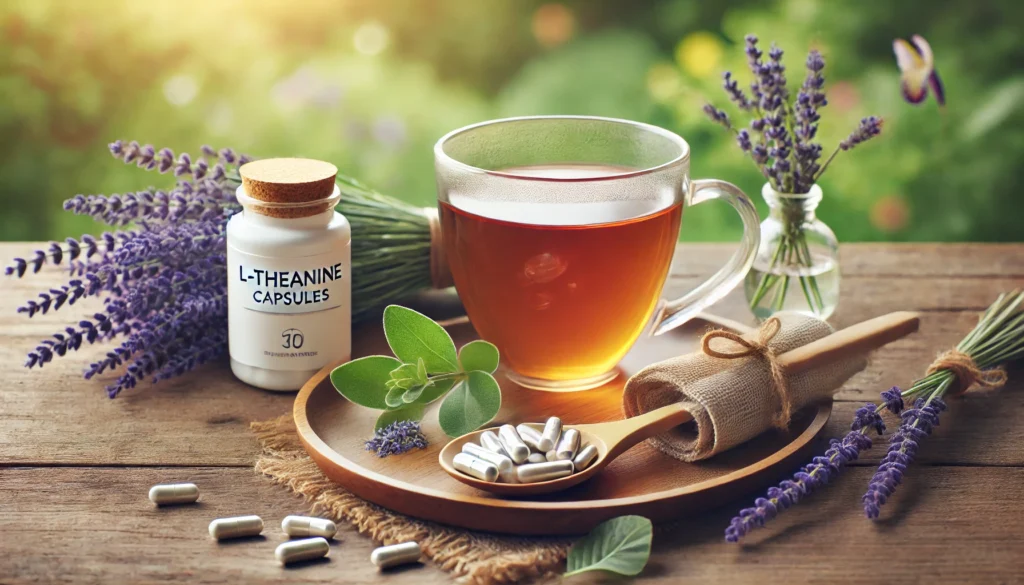Before diving into the supplements, it’s crucial to grasp the nature of anxiety and its effects on the body. Anxiety is a natural response to stress, characterized by feelings of tension, worried thoughts, and physical changes like increased blood pressure. Chronic anxiety can disrupt daily life, affecting sleep, mood, and overall well-being.
You may also like: Top 10 Herbs for Stress Relief
The Biological Mechanisms of Anxiety
Anxiety triggers a cascade of biological responses, primarily through the activation of the autonomic nervous system. This process involves the release of stress hormones such as adrenaline and cortisol, preparing the body for a ‘fight or flight’ response. Understanding these mechanisms helps in identifying how supplements can modulate these responses and provide relief.
Psychological and Emotional Impacts
Anxiety doesn’t just manifest physically; it has profound psychological and emotional impacts. Persistent worry, fear, and a sense of impending doom can overshadow daily activities, leading to avoidance behaviors and decreased quality of life. Effective management strategies must address these emotional facets to bring about holistic relief.
Long-term Consequences of Unmanaged Anxiety
If left unmanaged, chronic anxiety can lead to serious health issues, including cardiovascular problems, weakened immune function, and digestive disturbances. Prolonged exposure to high cortisol levels can also contribute to weight gain and metabolic disorders. Recognizing these long-term implications highlights the importance of early intervention and comprehensive management.

The Role of Supplements in Managing Anxiety
Supplements can be a valuable tool in the arsenal against anxiety. They work by supporting the body’s natural functions, promoting relaxation, and improving mood. However, it’s essential to remember that supplements are not a cure-all and should be used in conjunction with other treatment methods for the best results.
How Supplements Interact with the Nervous System
Many supplements target specific neurotransmitters and receptors in the brain, influencing the production and regulation of chemicals like serotonin, dopamine, and GABA. By enhancing or modulating these pathways, supplements can help stabilize mood and reduce anxiety symptoms.
Synergistic Effects with Lifestyle Changes
Supplements often work best when combined with lifestyle changes such as regular exercise, a balanced diet, and stress management techniques like meditation or yoga. These synergistic effects can amplify the benefits of supplements, promoting a more resilient stress response and enhanced mental health.
Limitations and Considerations in Supplement Use
While supplements offer promising benefits, they are not without limitations. Factors such as individual variability, potential side effects, and interactions with medications must be considered. Consulting with a healthcare professional ensures safe and effective integration into one’s wellness regimen.
Best Stress Relief Supplements
Ashwagandha
Ashwagandha is an adaptogenic herb with a rich history in Ayurvedic medicine. It is renowned for its ability to reduce stress and anxiety by lowering cortisol levels, the body’s primary stress hormone. Regular intake of ashwagandha has been shown to improve resilience against stress and enhance overall mental clarity.
Historical Context and Modern Use
Traditionally used in Indian medicine, ashwagandha has gained popularity in modern times for its adaptogenic properties. Its ability to modulate stress responses makes it a favorite among those seeking natural remedies for anxiety.
Scientific Evidence Supporting Ashwagandha
Numerous studies have demonstrated ashwagandha’s efficacy in reducing cortisol levels and improving symptoms of anxiety. Research suggests that it may also enhance cognitive function and support overall well-being.
Practical Tips for Incorporating Ashwagandha
Ashwagandha can be consumed in various forms, including capsules, powders, and teas. It’s advisable to start with a low dose and gradually increase as needed, under the guidance of a healthcare provider.
L-Theanine
L-Theanine, an amino acid found in green tea, promotes relaxation without causing drowsiness. It works by increasing the production of calming neurotransmitters like serotonin and dopamine. This supplement can be particularly beneficial for individuals who experience anxiety-related sleep disturbances.
Mechanisms of Action
L-Theanine enhances alpha brain wave activity, promoting a state of relaxed alertness. This unique property makes it ideal for reducing stress without impairing cognitive function.
Benefits Beyond Anxiety
In addition to its anxiety-reducing effects, L-Theanine may improve focus, enhance mood, and boost immune function. Its versatility makes it a valuable addition to any supplement regimen.
Integrating L-Theanine into Daily Life
L-Theanine can be taken as a standalone supplement or consumed through green tea. Pairing it with other calming practices, such as deep breathing exercises, can enhance its effects.
Magnesium
Magnesium is a vital mineral involved in numerous biochemical reactions in the body. It plays a significant role in brain function and mood regulation. Magnesium deficiency has been linked to increased anxiety and stress. Supplementing with magnesium can help restore balance and promote a sense of calm.
Understanding Magnesium’s Role in the Body
Magnesium supports neurotransmitter function and regulates the hypothalamic-pituitary-adrenal (HPA) axis, crucial for stress response. It also aids in muscle relaxation and cardiovascular health.
Addressing Deficiencies and Anxiety
A lack of magnesium can exacerbate anxiety symptoms, highlighting the importance of maintaining adequate levels. Supplementation can help bridge dietary gaps and alleviate stress.
Choosing the Right Magnesium Supplement
There are various forms of magnesium supplements, each with different absorption rates and effects. Consulting with a healthcare provider can help determine the best option for individual needs.

Vitamins to Help with Stress and Anxiety
Vitamin B Complex
B vitamins, particularly B6, B9 (folate), and B12, are crucial for maintaining a healthy nervous system. They help regulate mood and energy levels, which can be significantly impacted by stress. A deficiency in these vitamins can lead to heightened anxiety and depression.
The Importance of B Vitamins in Neurotransmitter Synthesis
B vitamins are essential cofactors in the production of neurotransmitters such as serotonin and dopamine. Ensuring adequate intake supports emotional stability and resilience to stress.
Signs of B Vitamin Deficiency
Symptoms of deficiency can include fatigue, irritability, and cognitive difficulties. Early detection and supplementation can prevent these issues from escalating.
Optimal Sources and Supplementation Strategies
B vitamins can be obtained from dietary sources such as whole grains, legumes, and leafy greens. For those with dietary restrictions, supplementation may be necessary to achieve optimal levels.
Vitamin D
Often referred to as the “sunshine vitamin,” vitamin D is essential for mood regulation. Low levels of vitamin D have been associated with increased anxiety and depression. Ensuring adequate intake through sunlight exposure or supplements can positively impact mental health.
The Connection Between Vitamin D and Mental Health
Vitamin D receptors are present in brain regions involved in mood regulation, suggesting a direct role in emotional well-being. Adequate levels are crucial for maintaining mental health.
Addressing Seasonal Affective Disorder
Low vitamin D levels are common during the winter months, contributing to seasonal affective disorder (SAD). Supplementation can help mitigate these seasonal mood fluctuations.
Safe Sun Exposure and Supplementation
Balancing sun exposure with skin protection is key to maintaining healthy vitamin D levels. Supplements can provide an alternative for those with limited sun exposure.
Omega-3 Fatty Acids
Omega-3 fatty acids, commonly found in fish oil, are known for their anti-inflammatory properties. They have been shown to reduce symptoms of anxiety by modulating brain function and reducing inflammation. Including omega-3 supplements in your diet can support emotional balance and cognitive health.
The Role of Omega-3s in Brain Health
Omega-3s support cell membrane integrity and neurotransmitter function, crucial for maintaining cognitive and emotional health. Their anti-inflammatory effects further contribute to mood stabilization.
Dietary Sources and Supplementation Options
Rich sources of omega-3s include fatty fish, flaxseeds, and walnuts. For those unable to consume these foods, high-quality fish oil supplements provide a convenient alternative.
Considerations for Optimal Omega-3 Intake
Balancing omega-3 intake with omega-6 fatty acids is important for maintaining overall health. Consulting with a nutritionist can help create a personalized supplementation plan.

Natural Supplements for Anxiety and Depression
St. John’s Wort
St. John’s Wort is a popular herbal remedy for mild to moderate depression. It works by increasing serotonin levels in the brain, similar to some antidepressants. While its efficacy in treating anxiety is still under study, it may offer relief for individuals with co-occurring symptoms of depression and anxiety.
Historical Use and Current Research
Historically used for its mood-enhancing properties, St. John’s Wort continues to be a subject of scientific investigation. Ongoing studies aim to clarify its effectiveness and safety profile for anxiety.
Potential Interactions and Safety Concerns
St. John’s Wort can interact with various medications, including antidepressants and contraceptives. Consulting with a healthcare provider is essential to prevent adverse effects.
Guidelines for Responsible Use
When considering St. John’s Wort, starting with a low dose and monitoring for side effects is recommended. Regular follow-ups with a healthcare professional ensure safe use.
Valerian Root
Valerian root has been used for centuries to promote relaxation and improve sleep quality. It is often recommended for individuals experiencing anxiety-related insomnia. Valerian works by increasing gamma-aminobutyric acid (GABA) levels in the brain, a neurotransmitter that induces calmness.
Traditional Applications and Modern Findings
Valerian root has a long history in traditional medicine for treating nervousness and sleep disorders. Contemporary research supports its calming effects, making it a popular choice for anxiety relief.
Sleep and Anxiety: A Bidirectional Relationship
Anxiety often disrupts sleep, creating a vicious cycle of sleeplessness and stress. Valerian’s ability to improve sleep quality can help break this cycle, leading to better overall mental health.
Optimal Dosage and Formulations
Valerian is available in various forms, including teas, capsules, and tinctures. Determining the appropriate dosage and form can enhance its therapeutic benefits.
Stress and Anxiety Supplement: What to Consider
When considering supplements for anxiety, it’s essential to take a personalized approach. Here are some factors to consider:
Consult a Healthcare Professional
Before starting any supplement regimen, consult with a healthcare provider to ensure it aligns with your individual health needs and does not interact with any medications you may be taking.
The Importance of Professional Guidance
Healthcare professionals can provide valuable insights into potential interactions and contraindications, ensuring safe and effective use of supplements.
Tailoring Supplements to Individual Needs
A personalized approach considers factors such as age, lifestyle, and existing health conditions, optimizing the benefits of supplementation.
Monitoring Progress and Adjusting as Needed
Regular check-ins with a healthcare provider allow for adjustments in dosage and supplement choice, maximizing therapeutic outcomes.
Quality and Dosage
Choose high-quality supplements from reputable brands. Pay attention to recommended dosages and be cautious of exceeding them, as more is not always better.
Ensuring Supplement Purity and Potency
Quality assurance ensures that supplements are free from contaminants and contain the stated ingredients. Choosing third-party tested products enhances trust and safety.
Understanding Dosage Recommendations
Adhering to dosage guidelines prevents potential side effects and ensures optimal efficacy. Consulting product labels and healthcare professionals can provide clarity.
The Risks of Over-Supplementation
Exceeding recommended dosages can lead to adverse effects and diminished benefits. Responsible use is key to maintaining health and well-being.
Lifestyle Integration
Supplements should complement a healthy lifestyle, including a balanced diet, regular exercise, and sufficient sleep. They work best when integrated into a holistic approach to wellness.
Balancing Diet and Supplementation
Supplements are not substitutes for a healthy diet. A balanced intake of nutrients from whole foods supports overall health and enhances supplement effects.
The Role of Exercise and Stress Management
Physical activity and stress-reducing practices like meditation enhance the body’s ability to cope with stress, amplifying the benefits of supplements.
Creating a Sustainable Wellness Routine
Consistency in lifestyle choices promotes lasting health benefits. Incorporating supplements into a comprehensive wellness plan can lead to improved mental and physical well-being.
Future Implications and Trends
The demand for natural anxiety relief supplements is on the rise, fueled by a growing interest in holistic health practices. As research continues to unveil the benefits and mechanisms of these supplements, their role in mental health management will likely expand. Innovations in biohacking and personalized nutrition may lead to more targeted and effective supplement solutions in the future.
The Growing Popularity of Natural Remedies
As individuals seek alternatives to pharmaceuticals, the popularity of natural supplements is surging. This trend reflects a broader shift towards integrative and preventative health practices.
Advances in Supplement Research and Development
Ongoing research is expanding our understanding of how supplements interact with the body. These insights drive the development of more effective and targeted formulations.
The Role of Technology in Personalized Nutrition
Technological advancements in genetic testing and data analysis are paving the way for personalized nutrition. Tailored supplement regimens may soon become a reality, offering customized solutions for anxiety management.
Conclusion
Incorporating natural supplements into your daily routine can be a practical step towards alleviating anxiety and enhancing overall well-being. While they are not a substitute for professional medical advice, these supplements can offer valuable support in managing stress and anxiety. As always, listen to your body and consult with healthcare professionals to tailor a plan that best suits your needs.
Emphasizing a Balanced Approach
A balanced approach that combines supplements with other therapeutic interventions maximizes the potential for anxiety relief. This holistic perspective supports long-term mental health.
Encouraging Informed Decision-Making
By understanding the potential benefits and applications of these supplements, health coaches, journalists, and biohackers alike can provide informed guidance and insights to those seeking natural remedies for anxiety.
Fostering a Culture of Wellness
Promoting awareness of natural supplements and their role in mental health encourages a culture of wellness. Empowering individuals with knowledge fosters proactive and informed health choices.
Further Reading:
Magnesium for Anxiety: Does It Help?
Top Supplements to Support Children with Anxiety: A Natural Approach
Important Note: The information contained in this article is for general informational purposes only, and should not be construed as health or medical advice, nor is it intended to diagnose, prevent, treat, or cure any disease or health condition. Before embarking on any diet, fitness regimen, or program of nutritional supplementation, it is advisable to consult your healthcare professional in order to determine its safety and probable efficacy in terms of your individual state of health.
Regarding Nutritional Supplements Or Other Non-Prescription Health Products: If any nutritional supplements or other non-prescription health products are mentioned in the foregoing article, any claims or statements made about them have not been evaluated by the U.S. Food and Drug Administration, and such nutritional supplements or other health products are not intended to diagnose, treat, cure, or prevent any disease.


